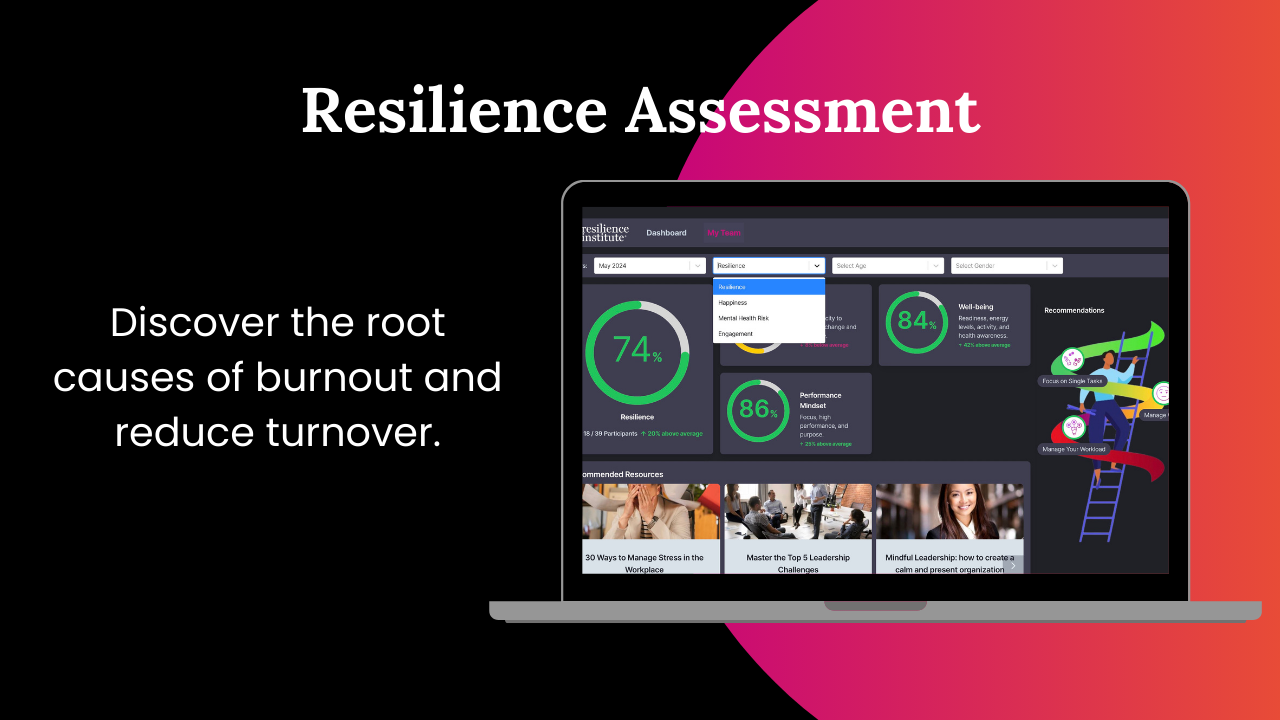
Building a Resilient Workforce: Insights from Gallup’s 2024 Report
The Gallup State of the Global Workplace 2024 report highlights significant challenges facing today’s workforce, including high levels of stress, declining employee wellbeing, and disengagement across many regions. The Resilience Institute offers a holistic approach to addressing these issues through resilience training, focusing on sustainable human performance and well-being. This blog post explores how resilience can counter the challenges identified in the report, offering a practical, data-driven solution for leaders and HR professionals.
A Global Snapshot of Employee Wellbeing
According to Gallup, global employee engagement remains low, with only 23% of employees engaged at work. Simultaneously, stress levels are high—41% of employees report experiencing significant stress daily. The report reveals that poor management practices and inadequate support for work-life balance contribute to these outcomes. Stress is more prevalent in poorly managed environments, often even exceeding that of those who are unemployed.
The Resilience Institute’s approach directly addresses these gaps. Our training is designed to build resilience, emphasizing not just stress management but proactive growth. Resilience is not merely the capacity to endure pressure but the ability to adapt, learn, and thrive amidst change. By focusing on emotional, physical, and mental well-being, our programs aim to elevate engagement and create environments where stress is managed constructively.
Beyond Surface-Level Solutions: A Holistic Approach
The report suggests that many organizations are addressing stress with surface-level solutions like wellness apps and generic stress management programs, yet these often fail to create meaningful change. This is where our holistic approach makes a difference. The Resilience Institute incorporates elements like emotional regulation, physical vitality, and mental clarity, going beyond basic wellness to create sustainable behavioral shifts.
We understand that true resilience requires a systems-level approach—addressing the interplay between work, life, and individual capabilities. This perspective ensures that interventions resonate with employees’ real needs, making resilience training more effective than quick fixes. Our training empowers individuals to manage their stress while enabling managers to support their teams better.
The Resilience Assessment: Measuring What Matters
While the Gallup report provides insights into engagement and general well-being, the Resilience Institute’s Resilience Assessment offers a deeper, more nuanced view of an individual’s strengths and challenges. The assessment measures factors like emotional stability, focus, and vitality—elements that can often remain hidden in traditional engagement surveys .
This data-driven approach helps organizations tailor their resilience strategies. For instance, the assessment can highlight specific areas where employees struggle, such as maintaining energy levels or managing anxiety. Armed with this information, leaders can implement targeted interventions, fostering a culture that is not only engaged but thriving. The Resilience Assessment goes beyond measuring stress—it provides actionable insights to guide continuous improvement.
Addressing Loneliness and Isolation
The Gallup report emphasizes a troubling rise in loneliness, especially among remote and younger workers. This isolation can deteriorate mental health, leading to disengagement and lower productivity. At the Resilience Institute, we understand that human connection is a cornerstone of resilience. Our programs include techniques to strengthen social bonds within teams, even in virtual settings.
Resilience training can foster a sense of belonging, encouraging openness and support among team members. Practices such as guided reflection sessions and small group discussions help individuals connect on a deeper level. Building these connections is crucial for reducing the negative impact of loneliness, making the workplace a source of community rather than isolation.
Building a Resilient Culture
Another key insight from Gallup is the critical role managers play in shaping employee experiences. Managers influence up to 70% of the variance in team engagement. Yet, they often struggle with stress themselves. Our training programs provide managers with tools to build resilience in themselves and their teams. By adopting practices like regular feedback, setting clear expectations, and modeling emotional intelligence, managers can create an environment that naturally reduces stress and boosts engagement.
Resilient leaders are better equipped to guide their teams through challenges, fostering a culture where stress is addressed constructively rather than becoming a source of chronic disengagement. This approach aligns closely with Gallup’s findings that organization-level initiatives—such as changes in management practices and improved resource allocation—are more effective than individual interventions alone.
Moving from Surviving to Thriving
Gallup’s analysis shows that engaged employees are more likely to thrive in their lives overall, not just at work. This finding is at the heart of the Resilience Institute’s mission. Our training is designed to help individuals move beyond survival mode—where stress and overwhelm dominate—to a state of thriving, where they can find meaning, purpose, and satisfaction in their roles.
A thriving workforce is not only more productive but also more innovative and adaptive. As organizations navigate the complexities of a globalized, rapidly changing work environment, resilience becomes a competitive advantage. It allows teams to adapt to shifting demands without losing their sense of well-being, ensuring long-term sustainability.
Conclusion: Resilience as a Solution
The State of the Global Workplace 2024 report paints a sobering picture of the modern work environment. High levels of stress, disengagement, and declining mental health present significant challenges for leaders. Yet, resilience offers a powerful solution. Through a holistic approach that addresses physical, emotional, and social well-being, organizations can create cultures that support sustainable performance and human flourishing.
The Resilience Assessment provides a unique tool to guide these efforts, offering insights that go deeper than traditional engagement metrics. By focusing on what truly matters—helping people become more adaptable, balanced, and connected—the Resilience Institute helps organizations turn the tide from a stressed workforce to a thriving one. It’s time to go beyond quick fixes and build resilience from within.

